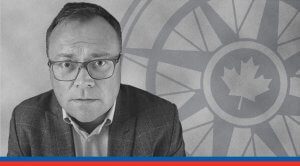 By adopting Magnitsky legislation, Canada can expect to be further targeted by Moscow, writes Marcus Kolga.
By adopting Magnitsky legislation, Canada can expect to be further targeted by Moscow, writes Marcus Kolga.
By Marcus Kolga, April 16, 2018
The democratic values that Canada shares with other liberal western nations are under assault. By manufacturing doubt, eroding confidence in our institutions, and disrupting the cohesion of our alliances, Vladimir Putin’s neo-Stalinist vision of global dominance requires his regime to undermine and destabilize western democracies through perpetual information warfare.
Public debate and elections in prominent democracies around the world have come under attack, including those in France, Germany, the United States, the United Kingdom, Spain and Mexico. There is no indication that Canada will be spared.
The global leadership that Canada has shown by adopting Magnitsky global human rights legislation has terrified the endemically corrupt Kremlin. Canada’s leadership has inspired several European nations to follow suit, imposing visa bans and asset freezes against the corrupt network of officials and oligarchs who support Putin — limiting their travel and access to international banks and assets. The targeted sanctions disrupt Putin’s arrangement with them, whose support is purchased with a mix of cash payments and political subservience.
Canada’s renewed leadership on international human rights and our global role in standing up for democracy, freedom and protecting our allies in NATO, represents a serious threat to Putin’s world of illiberal repression and violent imperialism.
As with other nations and leaders that challenge Putin’s actions and dominance, Canada is now on the front lines of the Kremlin’s information war, where Foreign Affairs Minister Chrystia Freeland and other Canadian critics of Putin have become prime targets in a broader campaign to destabilize Western democracy.
Putin’s objective is to undermine the credibility of anyone who poses a threat to the Kremlin or those within his orbit of corruption. Accusations are strategically developed and disseminated in Moscow as well as the international media, both traditional and social, fabricated or implied — either will do — so long as they manage to discredit and erode public trust and confidence.
Putin’s objective is to undermine the credibility of anyone who poses a threat to the Kremlin or those within his orbit of corruption.
Conspiracy theorist sites, of both the extreme left and right, are often the incubators of disinformation and smear campaigns. The story about Chrystia Freeland’s grandfather was first published on a fringe pro-Kremlin blog, when she was named Minister of Foreign Affairs. During WWII, her grandfather, Michael Chomiak, was a newspaper editor in Nazi occupied Poland. Conspiracy theorists and pro-Kremlin media — including Twitter trolls and bots — have alleged that Chomiak was a Nazi collaborator.
The nature of the allegation amounts to little more than a drive-by smear that offers media sympathetic to Putin a manufactured opportunity to defame Canada’s Minister of Foreign Affairs with a false “Nazi” label.
The Kremlin tactic against Freeland is not new nor should we be surprised by it. The Soviet KGB habitually labeled domestic and international critics as fascists or Nazis and that tradition has been carried forward by the former KGB leaders who now control Russia — including Putin. This may be the first time the larger Canadian public has seen this sort of targeted disinformation but it will not be the last.
Anyone who poses a threat to Russian dominance is susceptible to being targeted with the same taint. Ukrainian pro-democracy Maidan protesters, who braved Kremlin backed snipers to end corruption and move their country towards a European future, continue to be characterized as neo-Nazis by the Kremlin.
At an annual Russian nationalist Nashi youth rally for Putin a few years ago, effigies of the heads of many Putin critics were placed on wooden pikes with Nazi caps on their heads. Among those branded as “Nazis”, were assassinated Russian opposition leader, Boris Nemtsov, former Russian chess grandmaster and human right activist Garry Kasparov and Hillary Clinton.
In addition to demonstrating solidarity with our allies, Canada’s diplomatic expulsions represent a bold and critical defensive move, holding the Putin regime accountable when attempts are made to undermine our democracy with smears and lies.
The response to these expulsions from the Kremlin indicates that actions that Canada has taken against it in recent weeks and months are achieving results. We must be ready to counter future disinformation campaigns as we move closer to the 2019 federal election. The expulsion of Russian “diplomats” raise the stakes for the Kremlin as evidence of Putin’s strategic and targeted campaign to disrupt our democracy continue to mount. The 2016 American election and Brexit are all the proof we need.
Marcus Kolga is a communications strategist, documentary filmmaker, human rights activist and expert on Russian disinformation and foreign policy. He is a senior fellow at the Macdonald-Laurier Institute’s Centre for Advancing Canada’s Interests Abroad.




